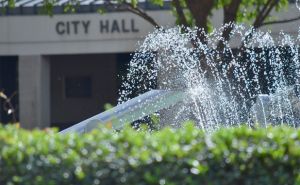The election to determine the winners of the two Senoia City Council seats comes on Nov. 8. And the four candidates for those seats got a chance to put themselves before the voters Oct. 27 at a forum held at the city’s Municipal Court building. Front and center at the forum were incumbents Bobby Graham and Maurice Grover and challengers Harry Ramos and Don Rehman.
One of the questions pertained to the recent town hall meeting held by the city’s Downtown Development Authority that solicited citizens’ preferences on improving the city. Specifically, the question noted the top two suggestions of creating a community center/pool/fitness/tennis complex and a structured walking trail around Lake Marimac. Candidates were asked if they were in favor of one project over the other and how the projects could be funded.
Rehman said that his suggestions at the forum were for a Waffle House and cart path connecting to Peachtree City, adding that he was not in favor of the two leading suggestions at the town hall meeting as top priorities and that other city needs should be met first.
Grover in his response said he was in favor of both projects though there is no current methodology to fund them. Grover added that if only one project could be funded he would opt for the structured walking trail. He also noted that there is $1.25 million for parks and recreation identified on the county’s upcoming 1-cent sales tax (SPLOST) initiative.
Ramos said amenities such as walking trails are ideal for families, adding that the city faced more important needs than the other top vote-getter which was not a priority.
And Graham on the issue said he agreed with both top choices. He expected that the walking trails should come first since the city can fund that project. The community center complex requires money that perhaps could be accommodated by the county, he said.
Another question dealt with the city’s tax equity with the county and the current work by a city-hired CPA to determine if city residents are paying county taxes for services they are not receiving while, at the same time, receiving those services based on the city taxes they pay. If that turns out to be the case what would candidates propose doing if the county drags its feet on refunding city taxpayers?
Grover said city taxpayers should get what they pay for, adding that a similar question is being posed in Gwinnett County that outcome will be decided by the Georgia Supreme Court.
“So we need to wait and see the outcome because this is an expensive issue,” Grover said, adding that the accountant’s report is not in so the finding at this time remains unknown.
Ramos in his response said tax equity is important, though there are other issues such as facilities for seniors that represent concerns that are more important.
“We need a good working relationship with the county and we need to work closely with them to meet the city’s important needs,” Ramos said.
Graham also noted that tax equity is a big issue, adding that he believes citizens are paying too much.
“But the final report is not in,” Graham said. “I think it would cost more to fight (the county) so we’d be better off negotiating with the county rather than forcing the issue.”
Rehman in his response called the tax equity question a “moment of truth.”
“I would have handled this differently,” Rehman said, with the retired military man describing what he likened to a military frontal attack that would put county staff on the defensive. Rehman said he would have identified one or two questionable tax equity items to present to the county. “I want tax equity but not at the cost of (creating) a problem (for the city).”
Another question asked what candidates would recommend to secure funds for city projects if the Coweta County SPLOST (Special Purpose Local Option Sales Tax) vote fails in March. Items on the SPLOST list pertaining to Senoia include $1.25 million for parks and recreation, $1.25 million for transportation improvements, $300,000 for public works projects, $200,000 for an early warning siren system and $120,000 for city hall facilities.
Graham was up first, saying that a failed vote in March would essentially result in one of three options for city government. The city would have to either forego the items on the list, try to get grants for some of the projects or raise taxes to pay for the projects. But raising taxes is a hard sell, Graham added.
Rehman in his response said that before considering raising taxes he would have public meetings conducted to solicit citizen input, adding that the council would need to prioritize the list.
Grover followed, saying that even with a failed vote the needed funds for some projects would come over a period of time and, when that occurs, the priorities should be the early warning siren system and parks and recreation.
Ramos said passage of the vote was the crucial for the city, adding that private industry might be approached for the parks and recreation item if the voter initiative fails.
Yet another question dealt with what industry candidates would try to help bring to the city to create new jobs and boost the local economy.
Graham answered saying basically that any industry locating in Senoia would be beneficial, though he thought a high-tech firm such as a software shop would be preferable.
Rehman said that, along with new businesses, the city should look at existing companies. That look should include a review of ordinances and any inappropriate business restrictions prior to soliciting new companies.
Grover in his response said he would support many types of industries, adding that there is a company that makes electric cars that has recently been looking at Senoia and another city in South Carolina.
Ramos said he would pursue light industries such as software companies and the manufacturer Grover referenced.
Other questions, both those prepared and others from the audience, were presented to the candidates in the 90-minute forum.
Senoia businessman Todd Baggarly had qualified for the for the election but withdrew his name for consideration. Baggarly said a city review of the alcohol ordinance determined that he was unable to hold elected office since he holds an alcoholic beverage license at his business. Baggarly said he will consider running for office at a later date if the law is changed.
The forum was hosted by the Senoia Tea Party Patriots.












Leave a Comment
You must be logged in to post a comment.